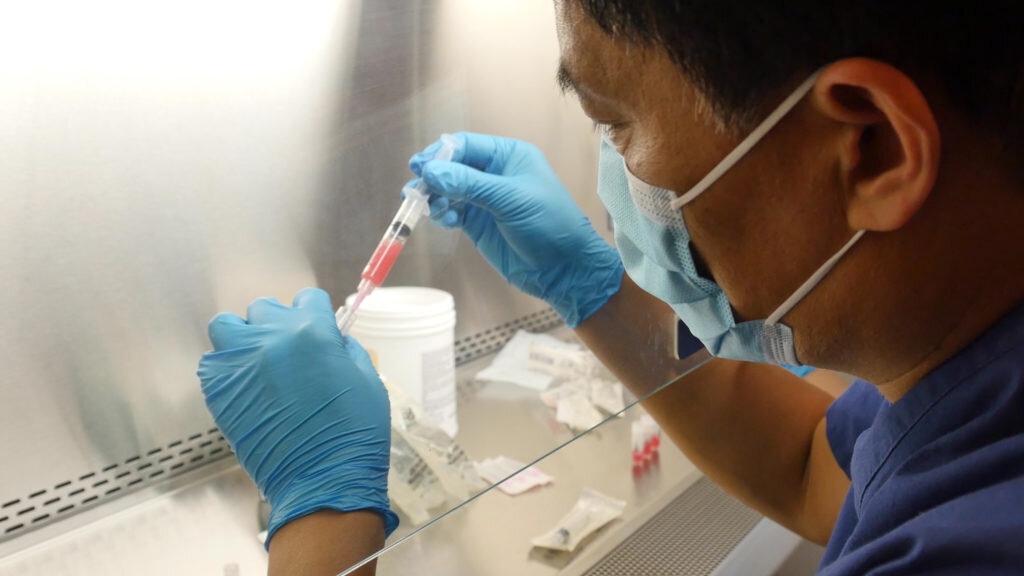Chinese Scientists Using Stem Cells to Treat Coronavirus Patients
/By Pat Anson, PNN Editor
As scientists around the world scramble to develop vaccines, therapeutic treatments and diagnostic tests for the coronavirus, Chinese doctors are having some initial success using stem cells to treat — and possibly cure — coronavirus infections.
Dr. Dongcheng Wu, who runs a stem cell lab in Wuhan, China – the epicenter of the COVID-19 outbreak – says he has successfully treated nine critically ill patients hospitalized with coronavirus pneumonia.
The patients had acute lung inflammation and serious breathing problems when they volunteered for experimental injections of Mesenchymal stem cells (MSCs) derived from human umbilical cords. All nine reportedly recovered within days.
“This treatment could potentially save thousands upon thousands of lives, so naturally we are very happy with these results,” Wu told the Daily Mail. 'Yes, it is a cure, but it is still very early in the process and we still have work to do.”
Wu is the chief science officer for Blue Horizon International (BHI), a New York-based foundation that supports research in stem cell therapy and cellular regenerative medicine.
BHI is currently recruiting 48 coronavirus patients in China for a placebo-controlled study of MSC injections.
In studies on mice, researchers found that MSC cells migrated to the lungs, where they significantly reduced inflammation and repaired damaged tissue.
BLUE HORIZON INTERNATIONAL
“So we thought what the heck, let's give it a shot. We gave nine patients, who were in hospital with severe, acute pulmonary dysfunction, we gave them core blood stem cells via IV and 100 percent of them got better, so of course we were astounded,” Dr. Brian Mehling, co-founder of BHI, told the Daily Mail.
The BHI study is not the first to use stem cells to treat coronavirus patients. According to the South China Morning Post, over a dozen clinical trials are underway in China using stem cells as a treatment for COVID-19.
Last month, a 65-year old woman infected with coronavirus was fighting for her life in an intensive care unit when she was injected with stem cells. Within days, her vital signs returned to normal, she began walking again, and tested negative for the COVID-19 virus.
Like Dr. Wu’s patients, the woman received MSC cells derived from the umbilical cords of newborn babies.
“Although only one case was shown here, it could be very important and inspire similar clinical practices in treating critically ill COVID-19 patients,” researchers reported in ChinaXiv, a Chinese website that publishes studies that have not yet been peer-reviewed.
Stem Cells ‘Could Cure’ Coronavirus Patients
Another new study, published in the journal Aging and Disease, found that MSCs given to seven coronavirus patients in Beijing “could cure or significantly improve” their symptoms.
“The pulmonary function and symptoms of these seven patients were significantly improved in 2 days after MSC transplantation. Among them, two common and one severe patient were recovered and discharged in 10 days after treatment,” researchers reported. “Thus, the intravenous transplantation of MSCs was safe and effective for treatment in patients with COVID-19 pneumonia, especially for the patients in critically severe condition.”
A Beijing doctor, who asked not to be identified, said there was growing discussion in the Chinese medical community about stem cells as a treatment for coronavirus.
“The stem cell industry may have some vested interest to promote their technology in this crisis, but if it really works, it should be made available to more patients,” she told the Morning Post.
Chinese stem cell researchers appear to be far ahead of their counterparts in the United States, where stem cell therapy remains controversial and there are more regulatory hurdles. Virtually all of the coronavirus stem cell studies listed in a U.S. database of clinical trials are being conducted in China.
Texas-based Celltex Therapeutics recently asked the Food and Drug Administration for permission to conduct a clinical study in the U.S. on the safety and efficacy of MSCs as a treatment for coronavirus.




